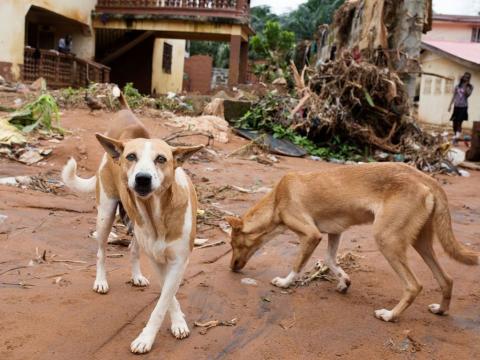By Kemo Cham
The Sierra Leone government has unveiled plans to vaccinate at least 10, 000 dogs in one week as part of a drive to tackle rising incidents of rabies infections in the country.
The mass vaccination campaign, which was scheduled to commence on Monday, is being carried out by the Ministry of Agriculture and the Ministry of Health, in collaboration with the Environment Protection Agency (EPA) and the National Livestock Animal Welfare and Rabies Control Taskforce (NLAWRCT).
Rabies is a deadly virus transmitted by an infected animal, usually dogs and cats, which spreads through their saliva when they bite their victim. There are several other animals that are known to transmit the virus, including bats and foxes.
According to the World Health Organisation (WHO), dogs are the main source of human rabies deaths worldwide, contributing up to 99% of all rabies transmissions to humans, mainly in Asia and Africa.
The virus, which spreads from the saliva of the vector, causes inflammation of the brain. The symptoms in infected humans include a fever with pain and unusual or unexplained tingling, pricking, or burning sensation at the wound site.
The good news is that rabies is preventable with vaccine and prompt treatment that include extensive washing of the bite wound after exposure, to prevent the virus from reaching the central nervous system which can lead to death. Prompt administration of treatment, generally within 10 days of infection, is crucial to prevent the disease.
According to the Animal Welfare Society of Sierra Leone, the dog population in the country currently stands at 2, 667, 985, including stray dogs found roaming the streets.
Most people who own dogs in Sierra Leone don’t take care for them. They are left to fend for themselves. And as a result, the sight of pack of dogs is common in Freetown and elsewhere in the country.
Figures from the Ministry of Agriculture indicates that in the last six months of 2018, 626 dog bites incidences and seven fatalities were reported. And the Ministry of Health says on average three people out of every 100, 000 die from rabies infection. This amounts to 210 deaths annually from the disease.
Campaigners blame the prevalence of cases of rabies on the deplorable condition in which the dogs live.
Officials say the upcoming vaccination campaign, which is being carried out as part commemoration of this year's World Rabies Day on September 28, will target both dogs and cats. It will be supported by supportive treatment against worms and ecto-parasites (mange).
World Rabies Day offers the opportunity for stakeholders in the welfare of animals and the prevention and control of rabies to reflect on the gains made in the fight against the viral disease and plan ahead. The day also commemorates the death of Dr. Luis Pasteur in 2007, the first scientist to discover the first vaccine for the prevention of rabies in both human and animals.
This year’s commemoration, which is the 13th, is being held on the theme: “Rabies: Vaccinate to Eliminate.”
A series of events have been lined up from September 23 to 28, including public education, community social mobilization, and sensitization and the mass vaccination campaign. There is also on schedule a symposium.
Minister of Agriculture and Forestry, Joseph Jonathan Ndanema, is expected to give a keynote speech at a special ceremony marking the commemoration, officials disclosed at a press conference last week.
The celebration will be held simultaneously in all 16 districts of the country, and the activities are being held with support from the United States Agency for International Development (USAID through its Breakthrough ACTION project.
For Sierra Leone, the move against rabies is a crucial aspect of the implementation of its “One Health” programme, which is the collaboration of multiple sectors to achieve one health outcome. One health is an approach under the Global Health Security Agenda that focuses on prevention of zoonotic diseases. Rabies is one of the priority zoonotic diseases in Sierra Leone, where it is considered “endemic”.
The global target for the elimination of dog mediated human rabies is 2030.
Experts say rabies elimination through mass dog vaccination is the most cost-effective strategy, as it saves lives and results in decline in the use of costly human post exposure prophylaxis (PEP).
Sierra Leone’s National Rabies Elimination Strategy (NRES) launched in 2017 entails a well-articulated five year (2019 – 2023) Action Plan with the objectives of increasing awareness on rabies and mass dog vaccination coverage nationwide. It specifically seeks to increase awareness and responsible dog ownership through public education.
The strategy focuses on eliminating rabies and adoption of holistic dog population management in Sierra Leone by 2030.
The strategy emphasizes on elimination of rabies in dogs by conducting mass dog vaccination targeting greater than 70 percent of dog population coverage annually for three consecutive years and dog population management. It also seeks to prevent rabies in humans by providing timely access to appropriate Post Exposure Treatment to all human cases of dog-bites suspected to be rabid and by increasing knowledge and skills among animal and human health workers on rabies and post-exposure management.
But health services providers constantly complain of shortage in
treatment drugs. And there is also the issue of shortage in expertise. Until about a year ago, the country had no expertise to confirm rabies cases because of lack of the necessary tests and equipment.
For a population of over 7 million, according to the 2015 Population and Housing Census, there were only five trained veterinary doctors in the country as of 2018.
© 2019 Politico Online









